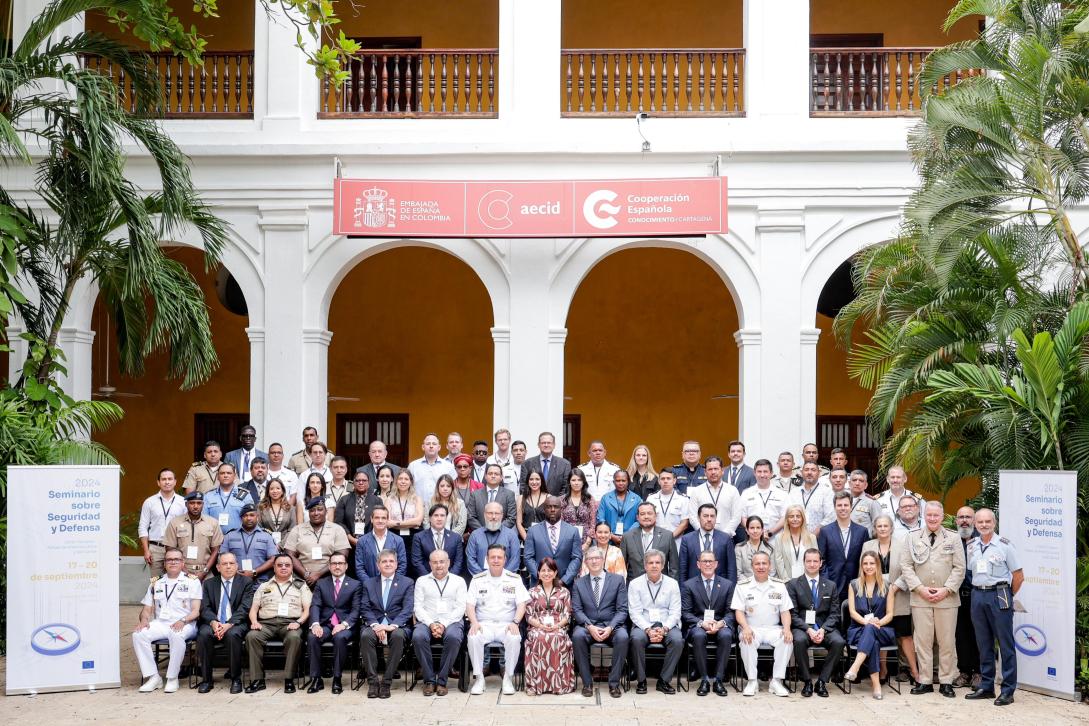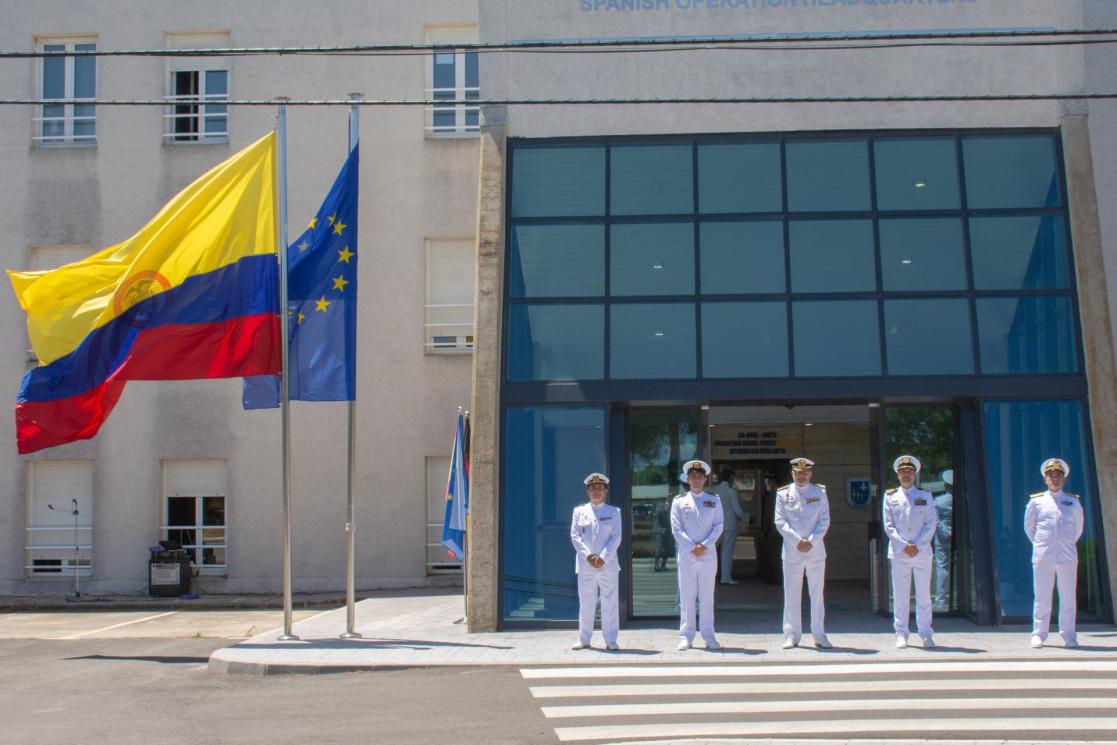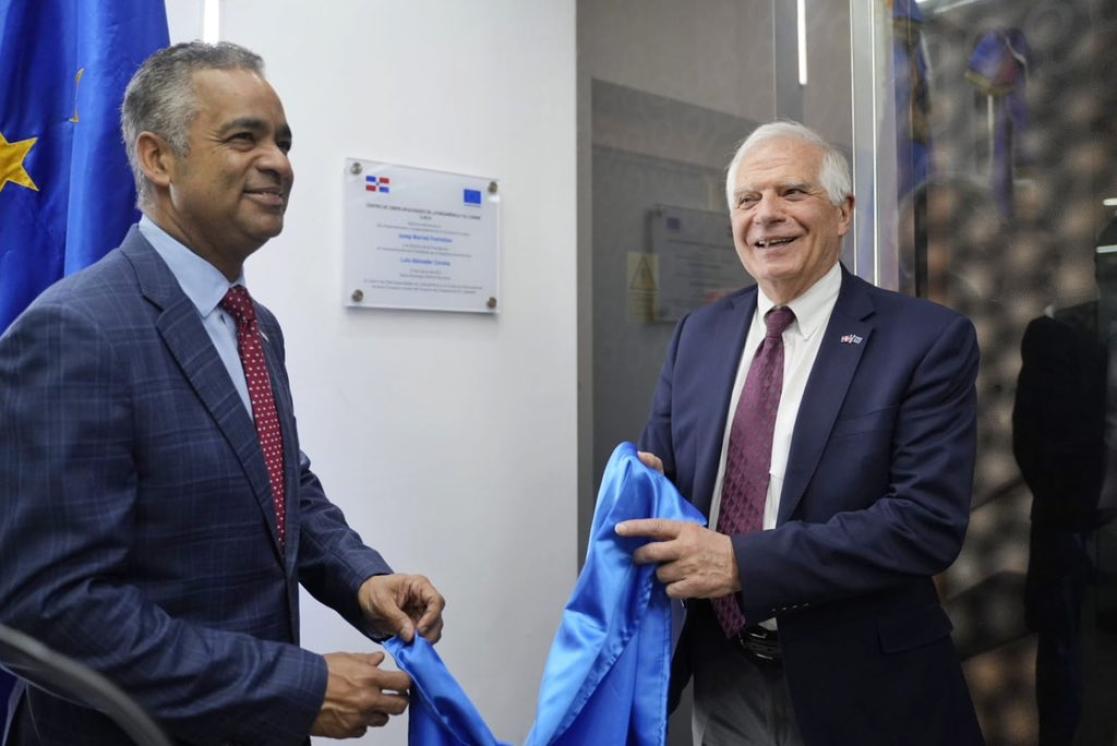EU & Latin America and the Caribbean bi-regional seminar on peace, security and defence challenges

Today's citizens face a multitude of evolving security and defence challenges, including hybrid threats, foreign information manipulation and interference, conflict fuelled by climate change and transnational crime.
These increasingly widespread security concerns will be discussed this week by civilian and military experts from 35 different countries, including representatives from the European Union (EU) and its Member States as well as 24 countries in the Latin America and the Caribbean (LAC) region. Top of the agenda is how to strengthen EU-LAC cooperation in order to enhance global and regional security and stability.
Cyber and maritime security are also among the issues being discussed at the four-day European Union - Latin America and the Caribbean Security and Defence Seminar, which takes place from 17 to 20 September in Cartagena de Indias, Colombia. This is the first bi-regional gathering of its kind, bringing together security experts from both regions .
The event is being organised with the participation and support of the European External Action Service, the European Security and Defense College (ESDC), Spain’s National High Defense Studies Centre (CESEDEN), the financial support of the European Commission through the Service for Foreign Policy Instruments, the Training Center of the Spanish Embassy in Colombia, and the EU Delegation in Colombia working with the Colombian authorities .
Partnerships are an indispensable pillar of the EU's security and defence efforts and peace support, and in recent years, the EU has gradually increased its dialogue and cooperation with Latin American and Caribbean partners also in this area.
In today’s volatile geopolitical climate, partnerships are essential for peace and security. We want to develop and strengthen tailored partnerships, focused on mutually beneficial agendas with key partners, including Latin America and the Caribbean.
Cosmin Dobran, EEAS Director for Peace, Partnerships and Crisis Management.
How EU and LAC countries work together on security and defence
Co-operation on crisis management
EU and LAC countries work together on crisis management missions and operations, including via a series of Framework Participation Agreements (FPAs), under the EU Common Security and Defence Policy (CSDP), with Chile and Colombia, which have facilitated the participation of those countries.
Currently Chile provides 5 military officers to EU military operation ALTHEA in Bosnia-Herzegovina. Brazil contributes 6 military officers as part of the Portuguese contingent to the EU’s Training Mission in the Central African Republic. Colombia contributes 2 officers to the EU’s naval operation ATALANTA off the coast of Somalia.

European Union, 2024
[Image: Operation Headquarters of EU Naval Force Somalia]
You can read more about specific EU CSDP missions and operations as well the broader EU CSDP policy.
EU-LAC mediation and dialogues around peace and security issues
The EU has been engaged in peace, security, and defence cooperation with Latin America and the Caribbean for more than two decades.
Examples of such cooperation include EU mediation efforts in Ecuador, Bolivia, and Venezuela as well as long-term support by the EU for the peace agreement and peacebuilding in Colombia.
The EU also has a Dialogue with Colombia on Environment, Climate Action and Sustainable Development.
Delivering better maritime security
The EU is one of the leading contributors to maritime security through operational engagements, naval presence and EU investment in maritime security capacity-building.
Colombia is present in the EU naval operation ATALANTA in the Indian Ocean. The Brazilian navy carried out exercise with European units within the framework of the Coordinated Maritime Presences in the Gulf of Guinea, in the Atlantic Ocean .
The EU also supports regional maritime security architectures and cooperation with a variety of partners, including the UN, NATO, regional organizations as well as a growing number of third countries.
Enhancing cyber security
Regarding cyber security, the EU is working on various fronts to promote cyber resilience, fight cybercrime, and boost cyber diplomacy and defence.
These measures include investing in long-term programs to build cyber security institutions and strengthen the rule of law as applied to cyberspace. Cyber security is one of the pillars of the EU-LAC Digital Alliance, launched in March 2023, a strategic framework to join forces for an inclusive and human-centric digital transformation in both regions and to develop bi-regional dialogue and cooperation across the full spectrum of digital and cyber issues.
In 2022, in order to strengthen practical collaboration in the region, the EU established a Latin America and Caribbean Cyber Competence Centre (LAC4) with a physical training facility in Santo Domingo, the Dominican Republic.

European Union, 2024
[Image: HRVP Josep Borrell Fontelles inaugurates the Latin America and Caribbean Cyber Capacity Center (LAC4)]
The long-term vision for the Latin America and Caribbean Cyber Competence Centre is to develop into an independent regional knowledge hub and training centre, supported by countries in the LAC region and international partners. This commitment was underlined at the EU-LAC High Level Dialogue on Cybersecurity, held in Santo Domingo (Dominican Republic), in February of 2024.
EU-LAC co-operation: background
The 2023 EU-CELAC Summit Declaration of July 2023 reaffirmed our common vision of a rule based peaceful international order. In the joint communication of June 2023 to the European Commission and the Council, A New Agenda for Relations between the EU and Latin America and the Caribbean, the EU stressed that “EU and LAC face common challenges around security and justice, which call for strengthening the bi-regional partnership and cooperation at all levels”.
The EU, including its Member States, and LAC are developing a variety of platforms to ensure that there is a constant exchange of information between the two regions and to deepen collaboration on security issues.
Strategic Compass: the EU’s policy approach to cooperation with partners on security and defence
As set out in the EU Strategic Compass, an ambitious plan of action for strengthening the EU's security and defence policy by 2030, the EU will bolster tailored partnerships where they are mutually beneficial, serve EU interests and support our values.
The Strategic Compass, a key part of the over EU Common Security and Defence Policy (CSDP), sets out policy guidelines for countering hybrid threats, cyberattacks and organized crime, as well as engaging in dialogue and action on climate and security and maritime security.
You can find out more about the EU strategic Compass by reading the factsheet, the full document as well as information about how it is being implemented.



